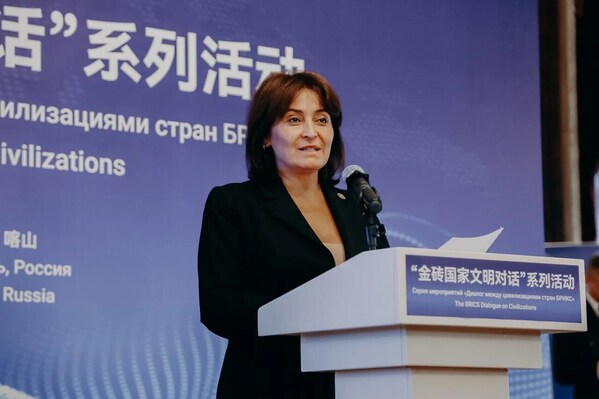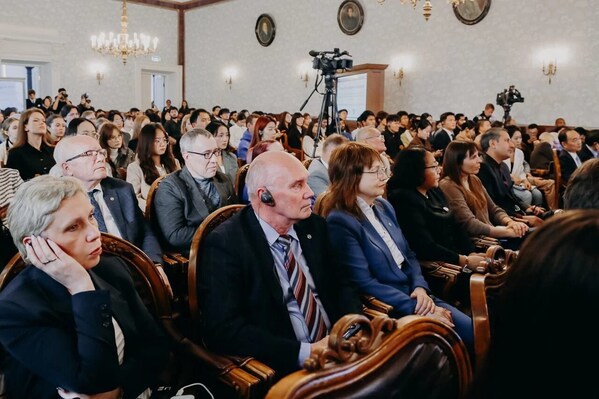KAZAN, Russia, Sept. 28, 2024 /PRNewswire/ -- The "BRICS Dialogue on Civilizations" event took place in Kazan, Russia, on September 24th, with over 300 participants, including representatives from institutions, experts, scholars, and youth from BRICS countries.
The event, themed "Gathering the Power of People-to-people and Cultural Exchanges to Build a Bright Future for BRICS", was co-hosted by the State Council Information Office of China, the Government of the Republic of Tatarstan of Russia, and the Consulate-General of China in Kazan. The event was jointly organized by the China Intercontinental Communication Center and Kazan Federal University.
Organizers emphasized that exchanges and mutual learning among civilizations are crucial drivers of human progress and world peace. They believe that through this dialogue, BRICS contriess can deepen mutual understanding and traditional friendships, strengthen cultural ties, and inspire more BRICS citizens to become ambassadors for cultural dialogue. They hope BRICS countries will actively support the Global Civilization Initiative, focus on people-to-people connections, and use the "BRICS+" cooperation platform to deepen cultural exchanges and foster new chapters of mutual understanding and friendship. Together, they aim to contribute "BRICS strength" to building a community with a shared future for humanity.

Leyla Rinatovna Fazleeva, Deputy Prime Minister of the Republic of Tatarstan of Russia, delivers a speech during the event.
In her remarks, Leyla Rinatovna Fazleeva highlighted that under the BRICS cooperation mechanism, cultural exchange and cooperation between BRICS nations have steadily deepened. She encouraged the expanded BRICS nations to continue fostering cultural dialogue, enriching exchange content, and building cooperative networks to turn the vision of cultural exchanges into reality.
During the story-sharing session, participants shared inspiring stories of how BRICS nations have fostered mutual understanding and deepened friendships through cross-border and cross-generational dialogues, advancing together through practical cooperation.
Tia Ju, Vice President of the Legislative Assembly of the State of Rio de Janeiro in Brazil, gave a speech via video link, and Talita Bernardo, Head of the office of the Second Vice President of the Legislative Assembly of the State of Rio de Janeiro, shared the deep ties that have formed between Rio de Janeiro and the Chinese people since the first Chinese immigrants arrived over 200 years ago.
Tamara Moskvina, the 83-year-old honored Russian coach, Denis Petrov, silver medalist at the Albertville Winter Olympics, Chen Lu, China's first world figure skating champion, and Anna Shcherbakova, Beijing Winter Olympics women's figure skating single champion, shared heartwarming stories of the friendship passed down throngh three generations of figure skaters from China and Russia.
Prof B.R.Deepak, Director of the Centre for Chinese and Southeast Asian Studies at Jawaharlal Nehru University, reflected on the long history of friendly exchanges between China and India, recalling Tagore's visit to China a century ago.
South African scholar Professor Paul Zilungisele Tembe used the song Glorious Years to highlight the BRICS countries' shared commitment to openness, inclusivity, and their common desire for global peace and development.
The BRICS Through the Lens photo exhibition attracted visitors, showcasing captivating moments from BRICS nations across areas such as economy, society, history, culture, environment, and youth development. Photographers from the UAE and Ethiopia captured the vibrancy of cities and the rhythm of rapidly changing times, while those from Egypt and Iran focused on colorful festival scenes, weaving a rich tapestry of cultural diversity. The China Horse Industry Association contributed stunning works that depicted the harmonious coexistence between humans and nature, while young people from Russia, Saudi Arabia, and other countries embodied the energy and hope for the future.
At the event, performers from the China Orient Ochestra played a medley of BRICS countries' famous songs using traditional Chinese instruments guzheng, showcasing the diverse cultural charm of BRICS countries and receiving enthusiastic applause from the audience.
The Kazan Chamber Orchestra of Russia delivered melodies rich in Tatar characteristics and played Glorious Years, which brought the event to its climax.
Zhan Changgan, a member of the China Arts and Crafts Association and a director of the Jiangxi Arts and Crafts Association, demonstrated the art of Jingdezhen ceramics to international guests. He also created ceramic works themed around the national flowers of BRICS countries, depicting a vivid scene of unity and collaboration among the BRICS nations.
At the event, Zhejiang University presented A Comprehensive Collection of Ancient Chinese Paintings to Kazan Federal University. The special exhibition of this collection drew considerable interest from the attendees.












